University Study: Nurses' Attitudes and Dementia Patient Care
VerifiedAdded on 2022/09/15
|16
|5184
|23
Report
AI Summary
This report examines the crucial role of nurses' attitudes in the care of dementia patients, emphasizing the impact of their approach on patient outcomes. The report highlights the challenges faced by dementia patients, particularly regarding nutrition and eating habits, within acute hospital settings. It stresses the importance of proper nutrition, addressing issues like poor appetite, communication difficulties, and medication side effects that affect food intake. The report also explores the need for tailored care, including the use of tools like Talking Mats and pictorial menus to improve communication and understand patient preferences. It emphasizes the significance of creating a supportive environment, providing discreet assistance, and ensuring adequate staffing during mealtimes to enhance the patient's dining experience and overall well-being. The report also discusses the importance of family involvement and staff training to improve the quality of care for individuals with dementia.
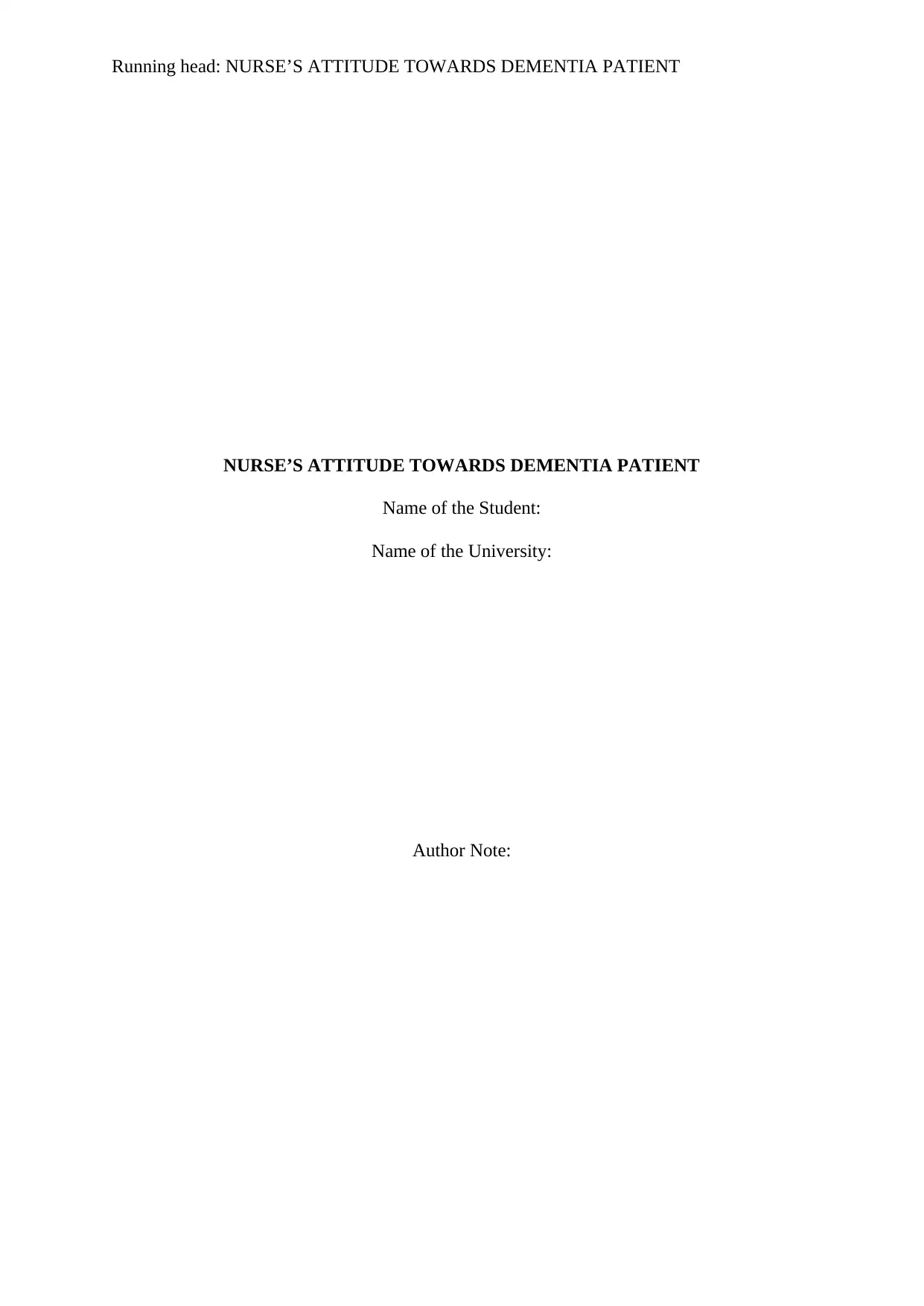
Running head: NURSE’S ATTITUDE TOWARDS DEMENTIA PATIENT
NURSE’S ATTITUDE TOWARDS DEMENTIA PATIENT
Name of the Student:
Name of the University:
Author Note:
NURSE’S ATTITUDE TOWARDS DEMENTIA PATIENT
Name of the Student:
Name of the University:
Author Note:
Paraphrase This Document
Need a fresh take? Get an instant paraphrase of this document with our AI Paraphraser
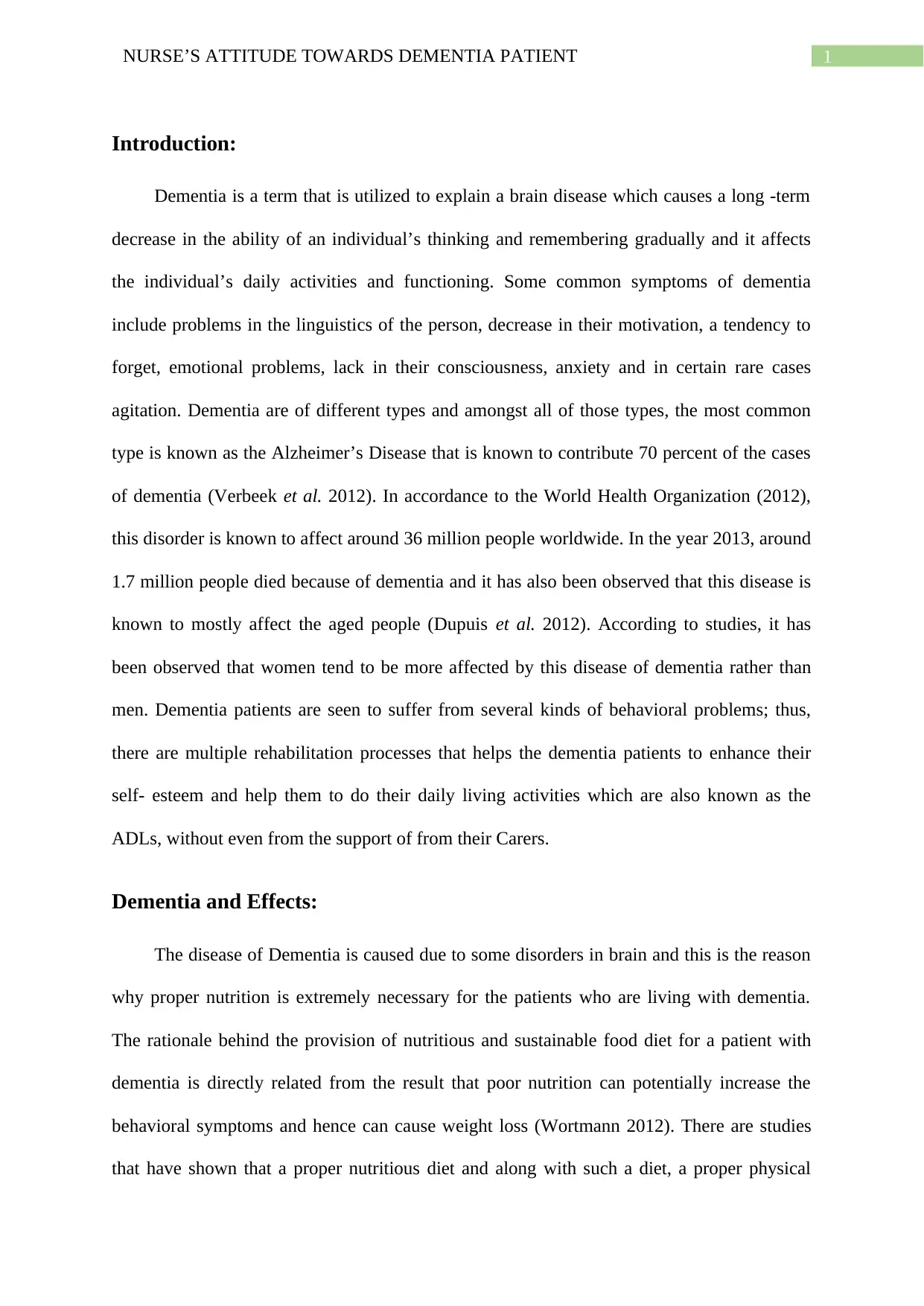
1NURSE’S ATTITUDE TOWARDS DEMENTIA PATIENT
Introduction:
Dementia is a term that is utilized to explain a brain disease which causes a long -term
decrease in the ability of an individual’s thinking and remembering gradually and it affects
the individual’s daily activities and functioning. Some common symptoms of dementia
include problems in the linguistics of the person, decrease in their motivation, a tendency to
forget, emotional problems, lack in their consciousness, anxiety and in certain rare cases
agitation. Dementia are of different types and amongst all of those types, the most common
type is known as the Alzheimer’s Disease that is known to contribute 70 percent of the cases
of dementia (Verbeek et al. 2012). In accordance to the World Health Organization (2012),
this disorder is known to affect around 36 million people worldwide. In the year 2013, around
1.7 million people died because of dementia and it has also been observed that this disease is
known to mostly affect the aged people (Dupuis et al. 2012). According to studies, it has
been observed that women tend to be more affected by this disease of dementia rather than
men. Dementia patients are seen to suffer from several kinds of behavioral problems; thus,
there are multiple rehabilitation processes that helps the dementia patients to enhance their
self- esteem and help them to do their daily living activities which are also known as the
ADLs, without even from the support of from their Carers.
Dementia and Effects:
The disease of Dementia is caused due to some disorders in brain and this is the reason
why proper nutrition is extremely necessary for the patients who are living with dementia.
The rationale behind the provision of nutritious and sustainable food diet for a patient with
dementia is directly related from the result that poor nutrition can potentially increase the
behavioral symptoms and hence can cause weight loss (Wortmann 2012). There are studies
that have shown that a proper nutritious diet and along with such a diet, a proper physical
Introduction:
Dementia is a term that is utilized to explain a brain disease which causes a long -term
decrease in the ability of an individual’s thinking and remembering gradually and it affects
the individual’s daily activities and functioning. Some common symptoms of dementia
include problems in the linguistics of the person, decrease in their motivation, a tendency to
forget, emotional problems, lack in their consciousness, anxiety and in certain rare cases
agitation. Dementia are of different types and amongst all of those types, the most common
type is known as the Alzheimer’s Disease that is known to contribute 70 percent of the cases
of dementia (Verbeek et al. 2012). In accordance to the World Health Organization (2012),
this disorder is known to affect around 36 million people worldwide. In the year 2013, around
1.7 million people died because of dementia and it has also been observed that this disease is
known to mostly affect the aged people (Dupuis et al. 2012). According to studies, it has
been observed that women tend to be more affected by this disease of dementia rather than
men. Dementia patients are seen to suffer from several kinds of behavioral problems; thus,
there are multiple rehabilitation processes that helps the dementia patients to enhance their
self- esteem and help them to do their daily living activities which are also known as the
ADLs, without even from the support of from their Carers.
Dementia and Effects:
The disease of Dementia is caused due to some disorders in brain and this is the reason
why proper nutrition is extremely necessary for the patients who are living with dementia.
The rationale behind the provision of nutritious and sustainable food diet for a patient with
dementia is directly related from the result that poor nutrition can potentially increase the
behavioral symptoms and hence can cause weight loss (Wortmann 2012). There are studies
that have shown that a proper nutritious diet and along with such a diet, a proper physical
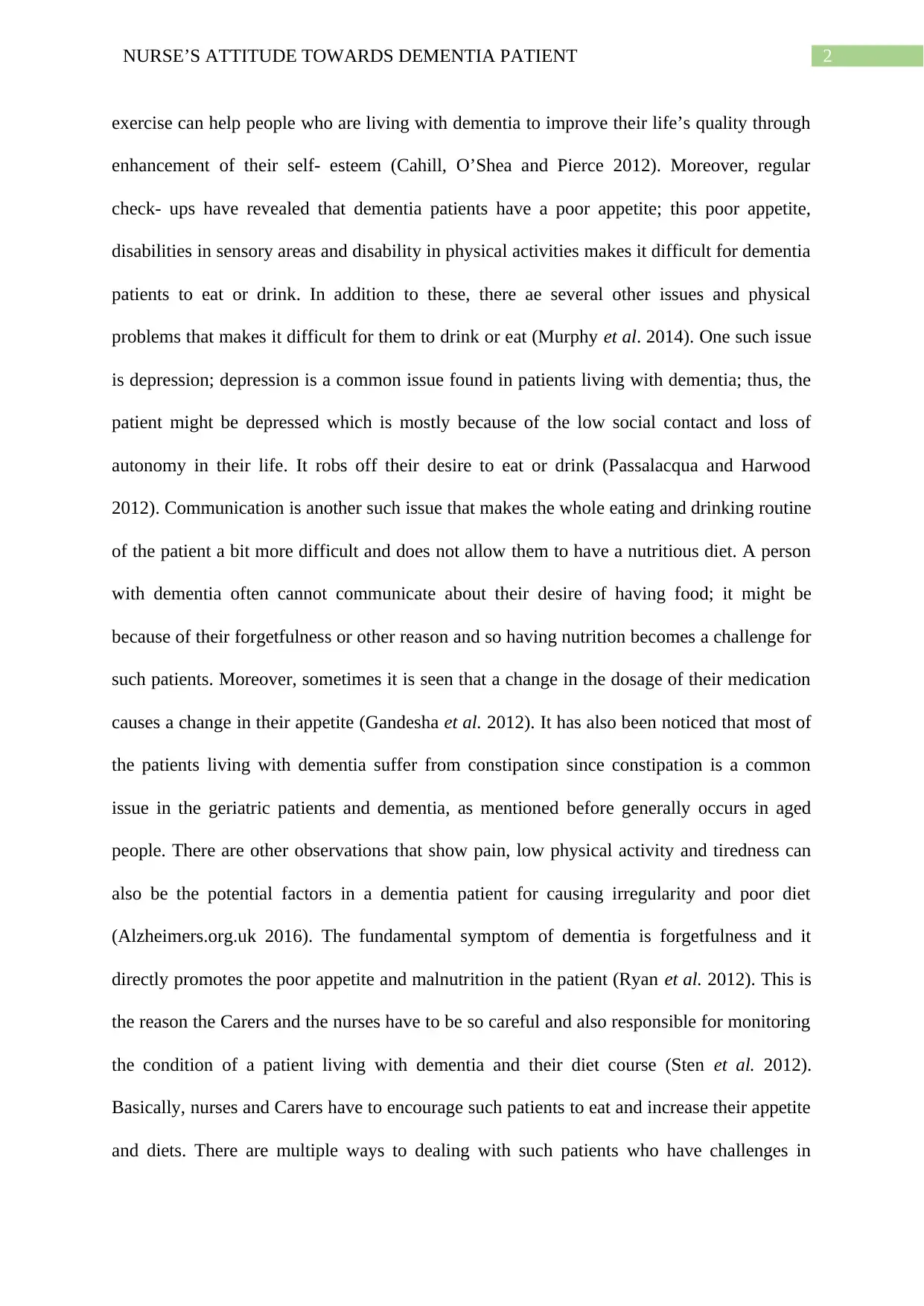
2NURSE’S ATTITUDE TOWARDS DEMENTIA PATIENT
exercise can help people who are living with dementia to improve their life’s quality through
enhancement of their self- esteem (Cahill, O’Shea and Pierce 2012). Moreover, regular
check- ups have revealed that dementia patients have a poor appetite; this poor appetite,
disabilities in sensory areas and disability in physical activities makes it difficult for dementia
patients to eat or drink. In addition to these, there ae several other issues and physical
problems that makes it difficult for them to drink or eat (Murphy et al. 2014). One such issue
is depression; depression is a common issue found in patients living with dementia; thus, the
patient might be depressed which is mostly because of the low social contact and loss of
autonomy in their life. It robs off their desire to eat or drink (Passalacqua and Harwood
2012). Communication is another such issue that makes the whole eating and drinking routine
of the patient a bit more difficult and does not allow them to have a nutritious diet. A person
with dementia often cannot communicate about their desire of having food; it might be
because of their forgetfulness or other reason and so having nutrition becomes a challenge for
such patients. Moreover, sometimes it is seen that a change in the dosage of their medication
causes a change in their appetite (Gandesha et al. 2012). It has also been noticed that most of
the patients living with dementia suffer from constipation since constipation is a common
issue in the geriatric patients and dementia, as mentioned before generally occurs in aged
people. There are other observations that show pain, low physical activity and tiredness can
also be the potential factors in a dementia patient for causing irregularity and poor diet
(Alzheimers.org.uk 2016). The fundamental symptom of dementia is forgetfulness and it
directly promotes the poor appetite and malnutrition in the patient (Ryan et al. 2012). This is
the reason the Carers and the nurses have to be so careful and also responsible for monitoring
the condition of a patient living with dementia and their diet course (Sten et al. 2012).
Basically, nurses and Carers have to encourage such patients to eat and increase their appetite
and diets. There are multiple ways to dealing with such patients who have challenges in
exercise can help people who are living with dementia to improve their life’s quality through
enhancement of their self- esteem (Cahill, O’Shea and Pierce 2012). Moreover, regular
check- ups have revealed that dementia patients have a poor appetite; this poor appetite,
disabilities in sensory areas and disability in physical activities makes it difficult for dementia
patients to eat or drink. In addition to these, there ae several other issues and physical
problems that makes it difficult for them to drink or eat (Murphy et al. 2014). One such issue
is depression; depression is a common issue found in patients living with dementia; thus, the
patient might be depressed which is mostly because of the low social contact and loss of
autonomy in their life. It robs off their desire to eat or drink (Passalacqua and Harwood
2012). Communication is another such issue that makes the whole eating and drinking routine
of the patient a bit more difficult and does not allow them to have a nutritious diet. A person
with dementia often cannot communicate about their desire of having food; it might be
because of their forgetfulness or other reason and so having nutrition becomes a challenge for
such patients. Moreover, sometimes it is seen that a change in the dosage of their medication
causes a change in their appetite (Gandesha et al. 2012). It has also been noticed that most of
the patients living with dementia suffer from constipation since constipation is a common
issue in the geriatric patients and dementia, as mentioned before generally occurs in aged
people. There are other observations that show pain, low physical activity and tiredness can
also be the potential factors in a dementia patient for causing irregularity and poor diet
(Alzheimers.org.uk 2016). The fundamental symptom of dementia is forgetfulness and it
directly promotes the poor appetite and malnutrition in the patient (Ryan et al. 2012). This is
the reason the Carers and the nurses have to be so careful and also responsible for monitoring
the condition of a patient living with dementia and their diet course (Sten et al. 2012).
Basically, nurses and Carers have to encourage such patients to eat and increase their appetite
and diets. There are multiple ways to dealing with such patients who have challenges in
⊘ This is a preview!⊘
Do you want full access?
Subscribe today to unlock all pages.

Trusted by 1+ million students worldwide
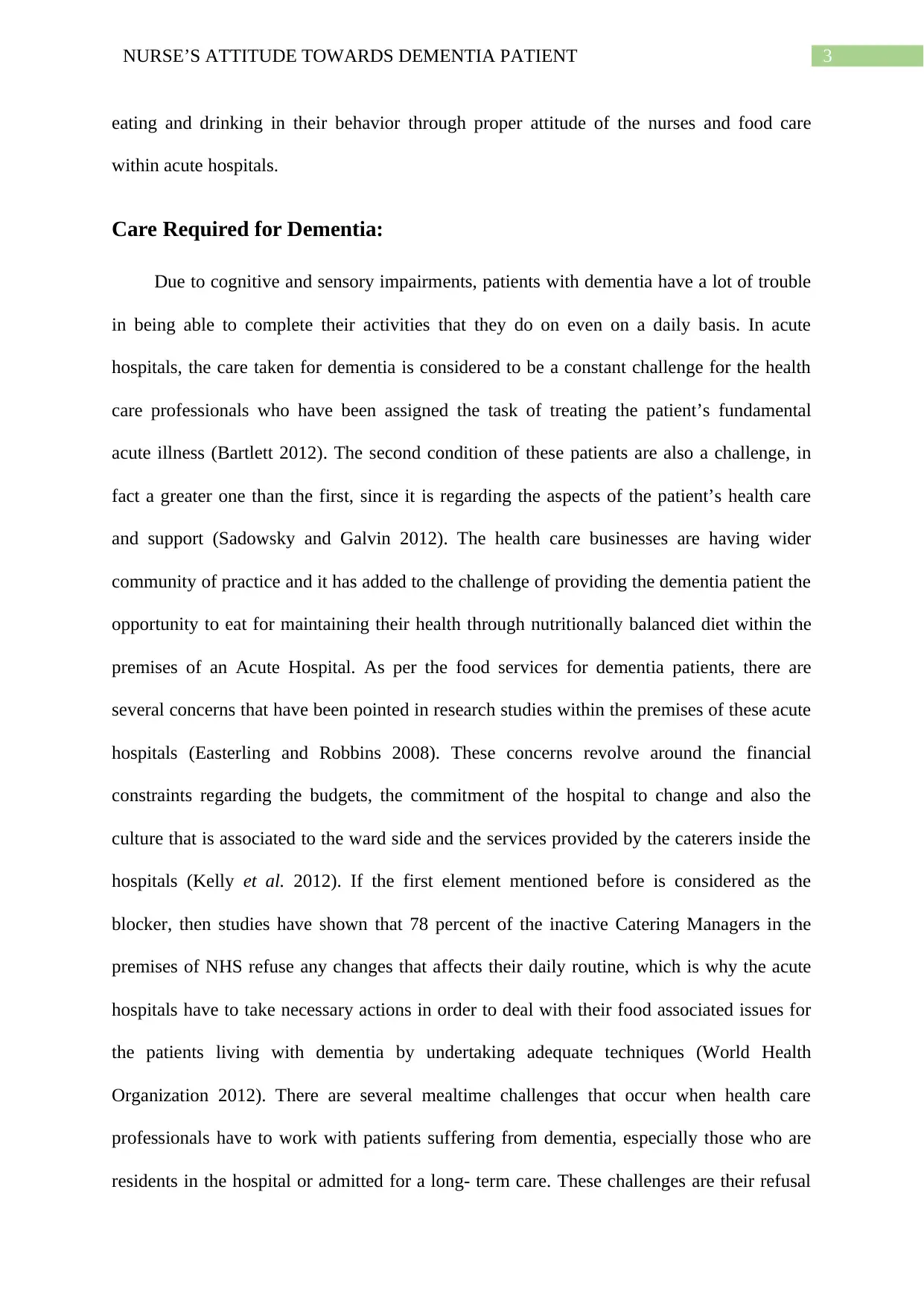
3NURSE’S ATTITUDE TOWARDS DEMENTIA PATIENT
eating and drinking in their behavior through proper attitude of the nurses and food care
within acute hospitals.
Care Required for Dementia:
Due to cognitive and sensory impairments, patients with dementia have a lot of trouble
in being able to complete their activities that they do on even on a daily basis. In acute
hospitals, the care taken for dementia is considered to be a constant challenge for the health
care professionals who have been assigned the task of treating the patient’s fundamental
acute illness (Bartlett 2012). The second condition of these patients are also a challenge, in
fact a greater one than the first, since it is regarding the aspects of the patient’s health care
and support (Sadowsky and Galvin 2012). The health care businesses are having wider
community of practice and it has added to the challenge of providing the dementia patient the
opportunity to eat for maintaining their health through nutritionally balanced diet within the
premises of an Acute Hospital. As per the food services for dementia patients, there are
several concerns that have been pointed in research studies within the premises of these acute
hospitals (Easterling and Robbins 2008). These concerns revolve around the financial
constraints regarding the budgets, the commitment of the hospital to change and also the
culture that is associated to the ward side and the services provided by the caterers inside the
hospitals (Kelly et al. 2012). If the first element mentioned before is considered as the
blocker, then studies have shown that 78 percent of the inactive Catering Managers in the
premises of NHS refuse any changes that affects their daily routine, which is why the acute
hospitals have to take necessary actions in order to deal with their food associated issues for
the patients living with dementia by undertaking adequate techniques (World Health
Organization 2012). There are several mealtime challenges that occur when health care
professionals have to work with patients suffering from dementia, especially those who are
residents in the hospital or admitted for a long- term care. These challenges are their refusal
eating and drinking in their behavior through proper attitude of the nurses and food care
within acute hospitals.
Care Required for Dementia:
Due to cognitive and sensory impairments, patients with dementia have a lot of trouble
in being able to complete their activities that they do on even on a daily basis. In acute
hospitals, the care taken for dementia is considered to be a constant challenge for the health
care professionals who have been assigned the task of treating the patient’s fundamental
acute illness (Bartlett 2012). The second condition of these patients are also a challenge, in
fact a greater one than the first, since it is regarding the aspects of the patient’s health care
and support (Sadowsky and Galvin 2012). The health care businesses are having wider
community of practice and it has added to the challenge of providing the dementia patient the
opportunity to eat for maintaining their health through nutritionally balanced diet within the
premises of an Acute Hospital. As per the food services for dementia patients, there are
several concerns that have been pointed in research studies within the premises of these acute
hospitals (Easterling and Robbins 2008). These concerns revolve around the financial
constraints regarding the budgets, the commitment of the hospital to change and also the
culture that is associated to the ward side and the services provided by the caterers inside the
hospitals (Kelly et al. 2012). If the first element mentioned before is considered as the
blocker, then studies have shown that 78 percent of the inactive Catering Managers in the
premises of NHS refuse any changes that affects their daily routine, which is why the acute
hospitals have to take necessary actions in order to deal with their food associated issues for
the patients living with dementia by undertaking adequate techniques (World Health
Organization 2012). There are several mealtime challenges that occur when health care
professionals have to work with patients suffering from dementia, especially those who are
residents in the hospital or admitted for a long- term care. These challenges are their refusal
Paraphrase This Document
Need a fresh take? Get an instant paraphrase of this document with our AI Paraphraser
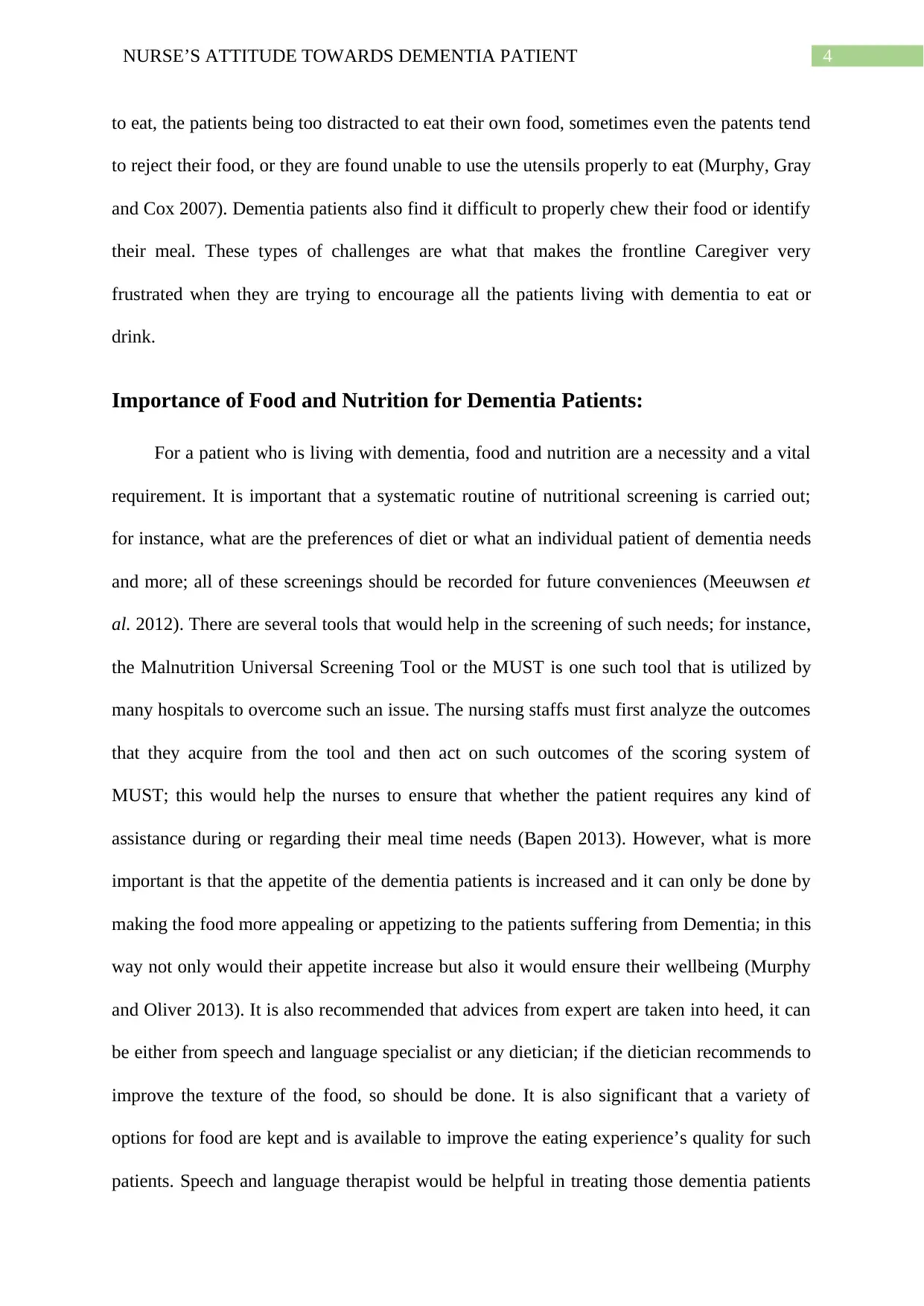
4NURSE’S ATTITUDE TOWARDS DEMENTIA PATIENT
to eat, the patients being too distracted to eat their own food, sometimes even the patents tend
to reject their food, or they are found unable to use the utensils properly to eat (Murphy, Gray
and Cox 2007). Dementia patients also find it difficult to properly chew their food or identify
their meal. These types of challenges are what that makes the frontline Caregiver very
frustrated when they are trying to encourage all the patients living with dementia to eat or
drink.
Importance of Food and Nutrition for Dementia Patients:
For a patient who is living with dementia, food and nutrition are a necessity and a vital
requirement. It is important that a systematic routine of nutritional screening is carried out;
for instance, what are the preferences of diet or what an individual patient of dementia needs
and more; all of these screenings should be recorded for future conveniences (Meeuwsen et
al. 2012). There are several tools that would help in the screening of such needs; for instance,
the Malnutrition Universal Screening Tool or the MUST is one such tool that is utilized by
many hospitals to overcome such an issue. The nursing staffs must first analyze the outcomes
that they acquire from the tool and then act on such outcomes of the scoring system of
MUST; this would help the nurses to ensure that whether the patient requires any kind of
assistance during or regarding their meal time needs (Bapen 2013). However, what is more
important is that the appetite of the dementia patients is increased and it can only be done by
making the food more appealing or appetizing to the patients suffering from Dementia; in this
way not only would their appetite increase but also it would ensure their wellbeing (Murphy
and Oliver 2013). It is also recommended that advices from expert are taken into heed, it can
be either from speech and language specialist or any dietician; if the dietician recommends to
improve the texture of the food, so should be done. It is also significant that a variety of
options for food are kept and is available to improve the eating experience’s quality for such
patients. Speech and language therapist would be helpful in treating those dementia patients
to eat, the patients being too distracted to eat their own food, sometimes even the patents tend
to reject their food, or they are found unable to use the utensils properly to eat (Murphy, Gray
and Cox 2007). Dementia patients also find it difficult to properly chew their food or identify
their meal. These types of challenges are what that makes the frontline Caregiver very
frustrated when they are trying to encourage all the patients living with dementia to eat or
drink.
Importance of Food and Nutrition for Dementia Patients:
For a patient who is living with dementia, food and nutrition are a necessity and a vital
requirement. It is important that a systematic routine of nutritional screening is carried out;
for instance, what are the preferences of diet or what an individual patient of dementia needs
and more; all of these screenings should be recorded for future conveniences (Meeuwsen et
al. 2012). There are several tools that would help in the screening of such needs; for instance,
the Malnutrition Universal Screening Tool or the MUST is one such tool that is utilized by
many hospitals to overcome such an issue. The nursing staffs must first analyze the outcomes
that they acquire from the tool and then act on such outcomes of the scoring system of
MUST; this would help the nurses to ensure that whether the patient requires any kind of
assistance during or regarding their meal time needs (Bapen 2013). However, what is more
important is that the appetite of the dementia patients is increased and it can only be done by
making the food more appealing or appetizing to the patients suffering from Dementia; in this
way not only would their appetite increase but also it would ensure their wellbeing (Murphy
and Oliver 2013). It is also recommended that advices from expert are taken into heed, it can
be either from speech and language specialist or any dietician; if the dietician recommends to
improve the texture of the food, so should be done. It is also significant that a variety of
options for food are kept and is available to improve the eating experience’s quality for such
patients. Speech and language therapist would be helpful in treating those dementia patients
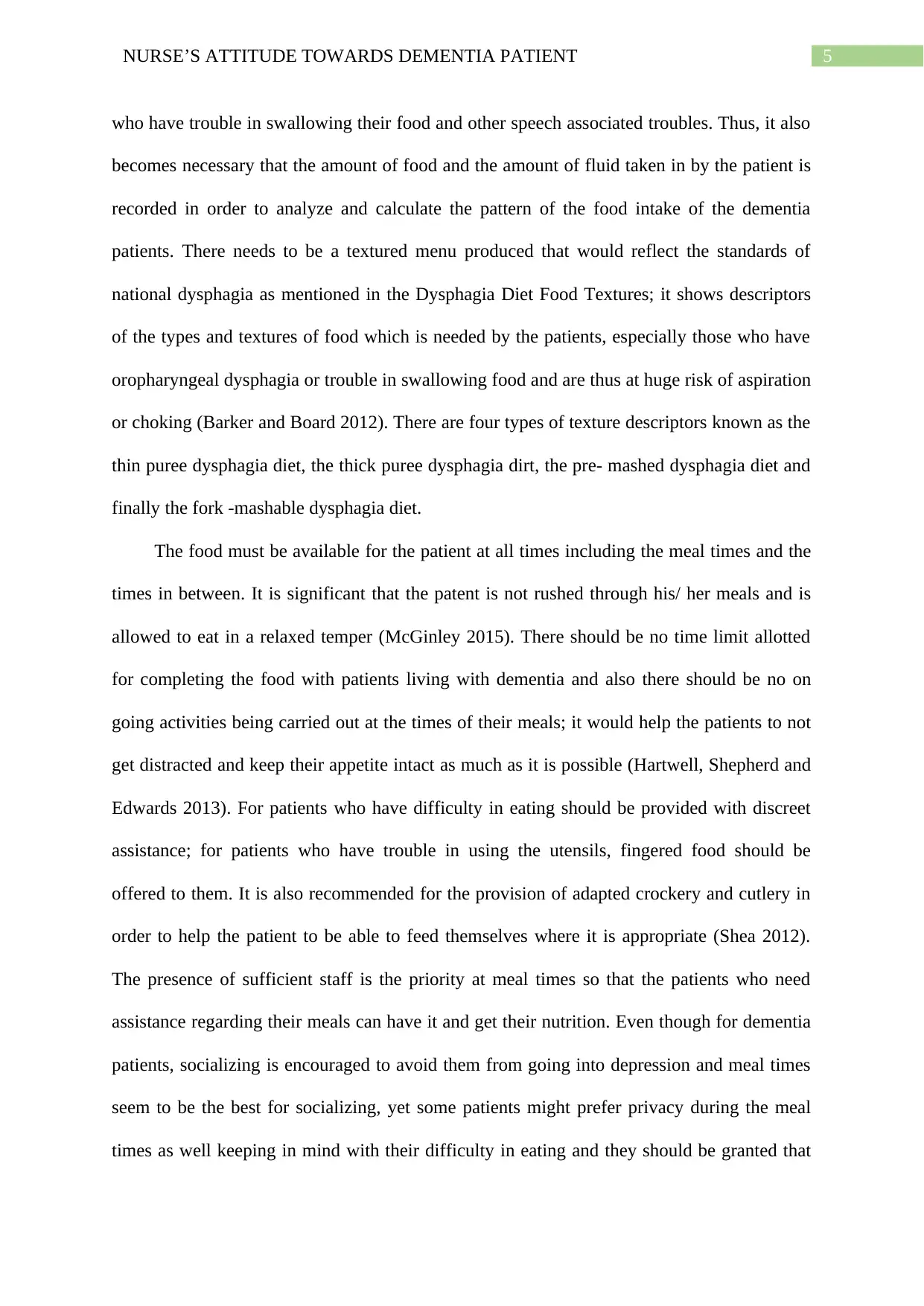
5NURSE’S ATTITUDE TOWARDS DEMENTIA PATIENT
who have trouble in swallowing their food and other speech associated troubles. Thus, it also
becomes necessary that the amount of food and the amount of fluid taken in by the patient is
recorded in order to analyze and calculate the pattern of the food intake of the dementia
patients. There needs to be a textured menu produced that would reflect the standards of
national dysphagia as mentioned in the Dysphagia Diet Food Textures; it shows descriptors
of the types and textures of food which is needed by the patients, especially those who have
oropharyngeal dysphagia or trouble in swallowing food and are thus at huge risk of aspiration
or choking (Barker and Board 2012). There are four types of texture descriptors known as the
thin puree dysphagia diet, the thick puree dysphagia dirt, the pre- mashed dysphagia diet and
finally the fork -mashable dysphagia diet.
The food must be available for the patient at all times including the meal times and the
times in between. It is significant that the patent is not rushed through his/ her meals and is
allowed to eat in a relaxed temper (McGinley 2015). There should be no time limit allotted
for completing the food with patients living with dementia and also there should be no on
going activities being carried out at the times of their meals; it would help the patients to not
get distracted and keep their appetite intact as much as it is possible (Hartwell, Shepherd and
Edwards 2013). For patients who have difficulty in eating should be provided with discreet
assistance; for patients who have trouble in using the utensils, fingered food should be
offered to them. It is also recommended for the provision of adapted crockery and cutlery in
order to help the patient to be able to feed themselves where it is appropriate (Shea 2012).
The presence of sufficient staff is the priority at meal times so that the patients who need
assistance regarding their meals can have it and get their nutrition. Even though for dementia
patients, socializing is encouraged to avoid them from going into depression and meal times
seem to be the best for socializing, yet some patients might prefer privacy during the meal
times as well keeping in mind with their difficulty in eating and they should be granted that
who have trouble in swallowing their food and other speech associated troubles. Thus, it also
becomes necessary that the amount of food and the amount of fluid taken in by the patient is
recorded in order to analyze and calculate the pattern of the food intake of the dementia
patients. There needs to be a textured menu produced that would reflect the standards of
national dysphagia as mentioned in the Dysphagia Diet Food Textures; it shows descriptors
of the types and textures of food which is needed by the patients, especially those who have
oropharyngeal dysphagia or trouble in swallowing food and are thus at huge risk of aspiration
or choking (Barker and Board 2012). There are four types of texture descriptors known as the
thin puree dysphagia diet, the thick puree dysphagia dirt, the pre- mashed dysphagia diet and
finally the fork -mashable dysphagia diet.
The food must be available for the patient at all times including the meal times and the
times in between. It is significant that the patent is not rushed through his/ her meals and is
allowed to eat in a relaxed temper (McGinley 2015). There should be no time limit allotted
for completing the food with patients living with dementia and also there should be no on
going activities being carried out at the times of their meals; it would help the patients to not
get distracted and keep their appetite intact as much as it is possible (Hartwell, Shepherd and
Edwards 2013). For patients who have difficulty in eating should be provided with discreet
assistance; for patients who have trouble in using the utensils, fingered food should be
offered to them. It is also recommended for the provision of adapted crockery and cutlery in
order to help the patient to be able to feed themselves where it is appropriate (Shea 2012).
The presence of sufficient staff is the priority at meal times so that the patients who need
assistance regarding their meals can have it and get their nutrition. Even though for dementia
patients, socializing is encouraged to avoid them from going into depression and meal times
seem to be the best for socializing, yet some patients might prefer privacy during the meal
times as well keeping in mind with their difficulty in eating and they should be granted that
⊘ This is a preview!⊘
Do you want full access?
Subscribe today to unlock all pages.

Trusted by 1+ million students worldwide
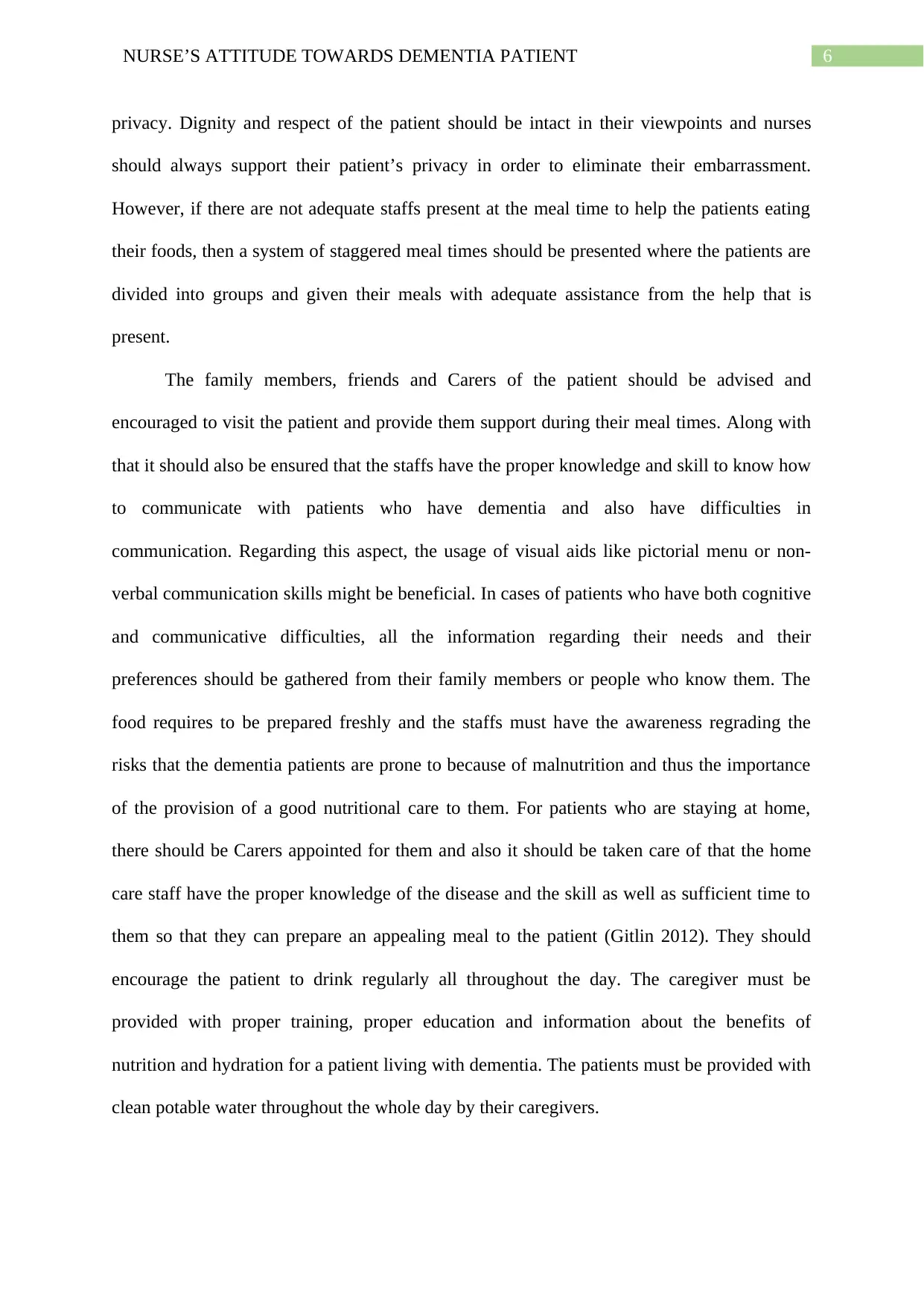
6NURSE’S ATTITUDE TOWARDS DEMENTIA PATIENT
privacy. Dignity and respect of the patient should be intact in their viewpoints and nurses
should always support their patient’s privacy in order to eliminate their embarrassment.
However, if there are not adequate staffs present at the meal time to help the patients eating
their foods, then a system of staggered meal times should be presented where the patients are
divided into groups and given their meals with adequate assistance from the help that is
present.
The family members, friends and Carers of the patient should be advised and
encouraged to visit the patient and provide them support during their meal times. Along with
that it should also be ensured that the staffs have the proper knowledge and skill to know how
to communicate with patients who have dementia and also have difficulties in
communication. Regarding this aspect, the usage of visual aids like pictorial menu or non-
verbal communication skills might be beneficial. In cases of patients who have both cognitive
and communicative difficulties, all the information regarding their needs and their
preferences should be gathered from their family members or people who know them. The
food requires to be prepared freshly and the staffs must have the awareness regrading the
risks that the dementia patients are prone to because of malnutrition and thus the importance
of the provision of a good nutritional care to them. For patients who are staying at home,
there should be Carers appointed for them and also it should be taken care of that the home
care staff have the proper knowledge of the disease and the skill as well as sufficient time to
them so that they can prepare an appealing meal to the patient (Gitlin 2012). They should
encourage the patient to drink regularly all throughout the day. The caregiver must be
provided with proper training, proper education and information about the benefits of
nutrition and hydration for a patient living with dementia. The patients must be provided with
clean potable water throughout the whole day by their caregivers.
privacy. Dignity and respect of the patient should be intact in their viewpoints and nurses
should always support their patient’s privacy in order to eliminate their embarrassment.
However, if there are not adequate staffs present at the meal time to help the patients eating
their foods, then a system of staggered meal times should be presented where the patients are
divided into groups and given their meals with adequate assistance from the help that is
present.
The family members, friends and Carers of the patient should be advised and
encouraged to visit the patient and provide them support during their meal times. Along with
that it should also be ensured that the staffs have the proper knowledge and skill to know how
to communicate with patients who have dementia and also have difficulties in
communication. Regarding this aspect, the usage of visual aids like pictorial menu or non-
verbal communication skills might be beneficial. In cases of patients who have both cognitive
and communicative difficulties, all the information regarding their needs and their
preferences should be gathered from their family members or people who know them. The
food requires to be prepared freshly and the staffs must have the awareness regrading the
risks that the dementia patients are prone to because of malnutrition and thus the importance
of the provision of a good nutritional care to them. For patients who are staying at home,
there should be Carers appointed for them and also it should be taken care of that the home
care staff have the proper knowledge of the disease and the skill as well as sufficient time to
them so that they can prepare an appealing meal to the patient (Gitlin 2012). They should
encourage the patient to drink regularly all throughout the day. The caregiver must be
provided with proper training, proper education and information about the benefits of
nutrition and hydration for a patient living with dementia. The patients must be provided with
clean potable water throughout the whole day by their caregivers.
Paraphrase This Document
Need a fresh take? Get an instant paraphrase of this document with our AI Paraphraser
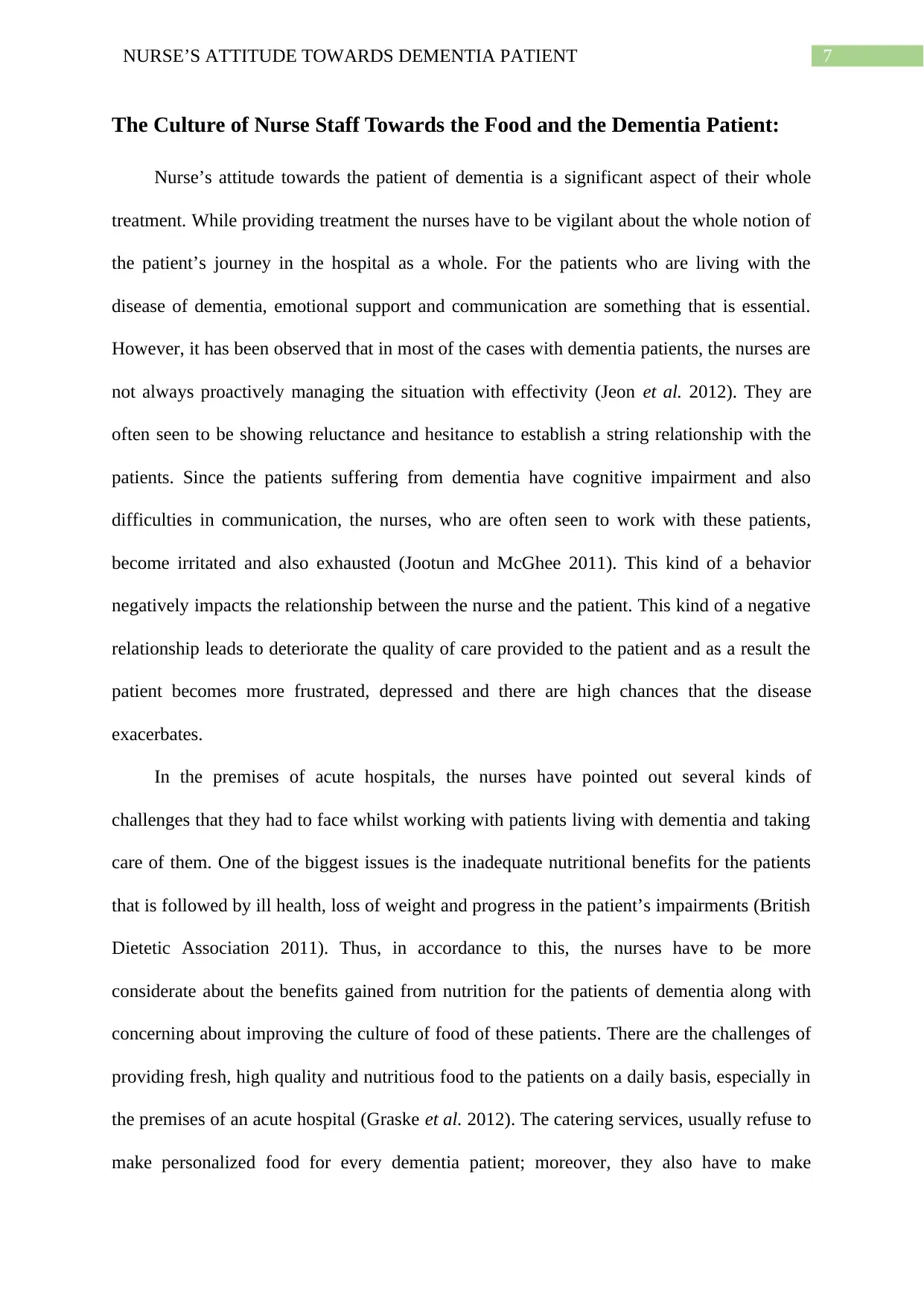
7NURSE’S ATTITUDE TOWARDS DEMENTIA PATIENT
The Culture of Nurse Staff Towards the Food and the Dementia Patient:
Nurse’s attitude towards the patient of dementia is a significant aspect of their whole
treatment. While providing treatment the nurses have to be vigilant about the whole notion of
the patient’s journey in the hospital as a whole. For the patients who are living with the
disease of dementia, emotional support and communication are something that is essential.
However, it has been observed that in most of the cases with dementia patients, the nurses are
not always proactively managing the situation with effectivity (Jeon et al. 2012). They are
often seen to be showing reluctance and hesitance to establish a string relationship with the
patients. Since the patients suffering from dementia have cognitive impairment and also
difficulties in communication, the nurses, who are often seen to work with these patients,
become irritated and also exhausted (Jootun and McGhee 2011). This kind of a behavior
negatively impacts the relationship between the nurse and the patient. This kind of a negative
relationship leads to deteriorate the quality of care provided to the patient and as a result the
patient becomes more frustrated, depressed and there are high chances that the disease
exacerbates.
In the premises of acute hospitals, the nurses have pointed out several kinds of
challenges that they had to face whilst working with patients living with dementia and taking
care of them. One of the biggest issues is the inadequate nutritional benefits for the patients
that is followed by ill health, loss of weight and progress in the patient’s impairments (British
Dietetic Association 2011). Thus, in accordance to this, the nurses have to be more
considerate about the benefits gained from nutrition for the patients of dementia along with
concerning about improving the culture of food of these patients. There are the challenges of
providing fresh, high quality and nutritious food to the patients on a daily basis, especially in
the premises of an acute hospital (Graske et al. 2012). The catering services, usually refuse to
make personalized food for every dementia patient; moreover, they also have to make
The Culture of Nurse Staff Towards the Food and the Dementia Patient:
Nurse’s attitude towards the patient of dementia is a significant aspect of their whole
treatment. While providing treatment the nurses have to be vigilant about the whole notion of
the patient’s journey in the hospital as a whole. For the patients who are living with the
disease of dementia, emotional support and communication are something that is essential.
However, it has been observed that in most of the cases with dementia patients, the nurses are
not always proactively managing the situation with effectivity (Jeon et al. 2012). They are
often seen to be showing reluctance and hesitance to establish a string relationship with the
patients. Since the patients suffering from dementia have cognitive impairment and also
difficulties in communication, the nurses, who are often seen to work with these patients,
become irritated and also exhausted (Jootun and McGhee 2011). This kind of a behavior
negatively impacts the relationship between the nurse and the patient. This kind of a negative
relationship leads to deteriorate the quality of care provided to the patient and as a result the
patient becomes more frustrated, depressed and there are high chances that the disease
exacerbates.
In the premises of acute hospitals, the nurses have pointed out several kinds of
challenges that they had to face whilst working with patients living with dementia and taking
care of them. One of the biggest issues is the inadequate nutritional benefits for the patients
that is followed by ill health, loss of weight and progress in the patient’s impairments (British
Dietetic Association 2011). Thus, in accordance to this, the nurses have to be more
considerate about the benefits gained from nutrition for the patients of dementia along with
concerning about improving the culture of food of these patients. There are the challenges of
providing fresh, high quality and nutritious food to the patients on a daily basis, especially in
the premises of an acute hospital (Graske et al. 2012). The catering services, usually refuse to
make personalized food for every dementia patient; moreover, they also have to make
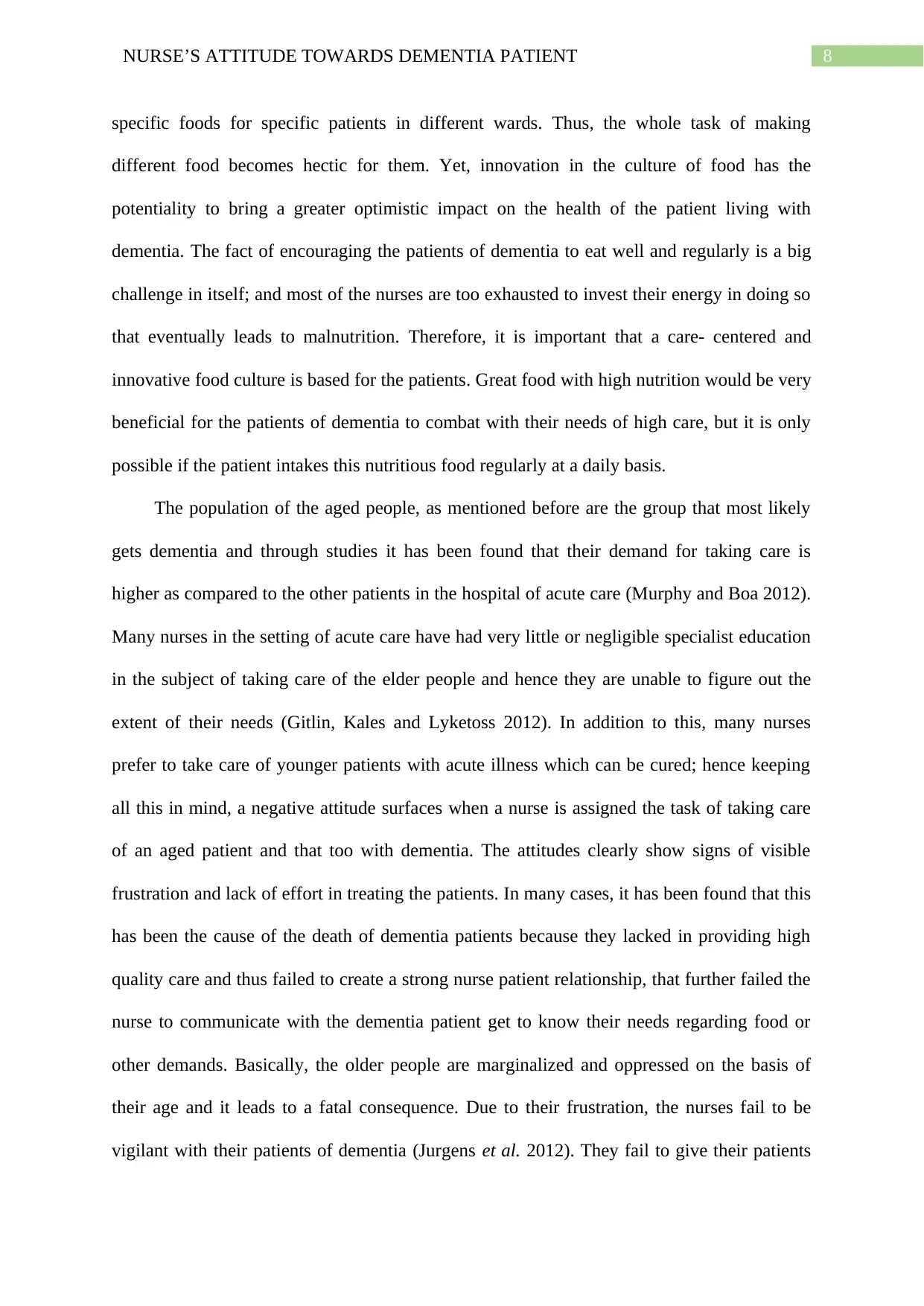
8NURSE’S ATTITUDE TOWARDS DEMENTIA PATIENT
specific foods for specific patients in different wards. Thus, the whole task of making
different food becomes hectic for them. Yet, innovation in the culture of food has the
potentiality to bring a greater optimistic impact on the health of the patient living with
dementia. The fact of encouraging the patients of dementia to eat well and regularly is a big
challenge in itself; and most of the nurses are too exhausted to invest their energy in doing so
that eventually leads to malnutrition. Therefore, it is important that a care- centered and
innovative food culture is based for the patients. Great food with high nutrition would be very
beneficial for the patients of dementia to combat with their needs of high care, but it is only
possible if the patient intakes this nutritious food regularly at a daily basis.
The population of the aged people, as mentioned before are the group that most likely
gets dementia and through studies it has been found that their demand for taking care is
higher as compared to the other patients in the hospital of acute care (Murphy and Boa 2012).
Many nurses in the setting of acute care have had very little or negligible specialist education
in the subject of taking care of the elder people and hence they are unable to figure out the
extent of their needs (Gitlin, Kales and Lyketoss 2012). In addition to this, many nurses
prefer to take care of younger patients with acute illness which can be cured; hence keeping
all this in mind, a negative attitude surfaces when a nurse is assigned the task of taking care
of an aged patient and that too with dementia. The attitudes clearly show signs of visible
frustration and lack of effort in treating the patients. In many cases, it has been found that this
has been the cause of the death of dementia patients because they lacked in providing high
quality care and thus failed to create a strong nurse patient relationship, that further failed the
nurse to communicate with the dementia patient get to know their needs regarding food or
other demands. Basically, the older people are marginalized and oppressed on the basis of
their age and it leads to a fatal consequence. Due to their frustration, the nurses fail to be
vigilant with their patients of dementia (Jurgens et al. 2012). They fail to give their patients
specific foods for specific patients in different wards. Thus, the whole task of making
different food becomes hectic for them. Yet, innovation in the culture of food has the
potentiality to bring a greater optimistic impact on the health of the patient living with
dementia. The fact of encouraging the patients of dementia to eat well and regularly is a big
challenge in itself; and most of the nurses are too exhausted to invest their energy in doing so
that eventually leads to malnutrition. Therefore, it is important that a care- centered and
innovative food culture is based for the patients. Great food with high nutrition would be very
beneficial for the patients of dementia to combat with their needs of high care, but it is only
possible if the patient intakes this nutritious food regularly at a daily basis.
The population of the aged people, as mentioned before are the group that most likely
gets dementia and through studies it has been found that their demand for taking care is
higher as compared to the other patients in the hospital of acute care (Murphy and Boa 2012).
Many nurses in the setting of acute care have had very little or negligible specialist education
in the subject of taking care of the elder people and hence they are unable to figure out the
extent of their needs (Gitlin, Kales and Lyketoss 2012). In addition to this, many nurses
prefer to take care of younger patients with acute illness which can be cured; hence keeping
all this in mind, a negative attitude surfaces when a nurse is assigned the task of taking care
of an aged patient and that too with dementia. The attitudes clearly show signs of visible
frustration and lack of effort in treating the patients. In many cases, it has been found that this
has been the cause of the death of dementia patients because they lacked in providing high
quality care and thus failed to create a strong nurse patient relationship, that further failed the
nurse to communicate with the dementia patient get to know their needs regarding food or
other demands. Basically, the older people are marginalized and oppressed on the basis of
their age and it leads to a fatal consequence. Due to their frustration, the nurses fail to be
vigilant with their patients of dementia (Jurgens et al. 2012). They fail to give their patients
⊘ This is a preview!⊘
Do you want full access?
Subscribe today to unlock all pages.

Trusted by 1+ million students worldwide

9NURSE’S ATTITUDE TOWARDS DEMENTIA PATIENT
the proper privacy that is required for their dignity; the reason to be unable to understand all
of this is because of the lack of specialist education in aspects of treating the old age people.
As a lack of this education, most of the nurses hold a negative view about old age and this
view point is visible through their attitudes. And this attitude changes the whole provision of
care to the patient; it must be understood by the nurse why it is important to give the
dementia patients their privacy. Their inability to eat or do any physical activity should be
managed with patience and kindness and not through frustration; due to cognitive and
communicative impairments, it becomes difficult to build a strong relationship with the
patient, but it would not be a good idea to be frustrated and stop trying after a few days
(Nolan 2012). Through proper vigilance and kindness, the patients need to be fed and kept
hydrated 24 hours a day. The nurses must understand that as musch as it is important for
encouraging the dementia patients to socialize, but when they want some privacy, they should
be given so because generally it is the embarrassment of not being able to do a certain task
that makes the patients make themselves aloof (Amujo 2015). And this decision should be
respected. The meal times require the assistance of the nurses the most, which is when the
nurses have to show their patience the most; none of the meal should be rushed through, there
might be a proper time of providing meals, but there should not be any time limit on finishing
the meal. The nurses should also be aware of each dementia patients’ individual needs and
feed them accordingly to keep nutrition in them.
Conclusion:
Dementia is a disease that affects the brain of the people especially the aged ones and
the care that is associated with this disease is acute. The patients tend to lose their ability to
remember along with other cognitive impairments, which is why they need constant care
everywhere. However, there are a lot of challenges regarding the treatment of patients living
the proper privacy that is required for their dignity; the reason to be unable to understand all
of this is because of the lack of specialist education in aspects of treating the old age people.
As a lack of this education, most of the nurses hold a negative view about old age and this
view point is visible through their attitudes. And this attitude changes the whole provision of
care to the patient; it must be understood by the nurse why it is important to give the
dementia patients their privacy. Their inability to eat or do any physical activity should be
managed with patience and kindness and not through frustration; due to cognitive and
communicative impairments, it becomes difficult to build a strong relationship with the
patient, but it would not be a good idea to be frustrated and stop trying after a few days
(Nolan 2012). Through proper vigilance and kindness, the patients need to be fed and kept
hydrated 24 hours a day. The nurses must understand that as musch as it is important for
encouraging the dementia patients to socialize, but when they want some privacy, they should
be given so because generally it is the embarrassment of not being able to do a certain task
that makes the patients make themselves aloof (Amujo 2015). And this decision should be
respected. The meal times require the assistance of the nurses the most, which is when the
nurses have to show their patience the most; none of the meal should be rushed through, there
might be a proper time of providing meals, but there should not be any time limit on finishing
the meal. The nurses should also be aware of each dementia patients’ individual needs and
feed them accordingly to keep nutrition in them.
Conclusion:
Dementia is a disease that affects the brain of the people especially the aged ones and
the care that is associated with this disease is acute. The patients tend to lose their ability to
remember along with other cognitive impairments, which is why they need constant care
everywhere. However, there are a lot of challenges regarding the treatment of patients living
Paraphrase This Document
Need a fresh take? Get an instant paraphrase of this document with our AI Paraphraser
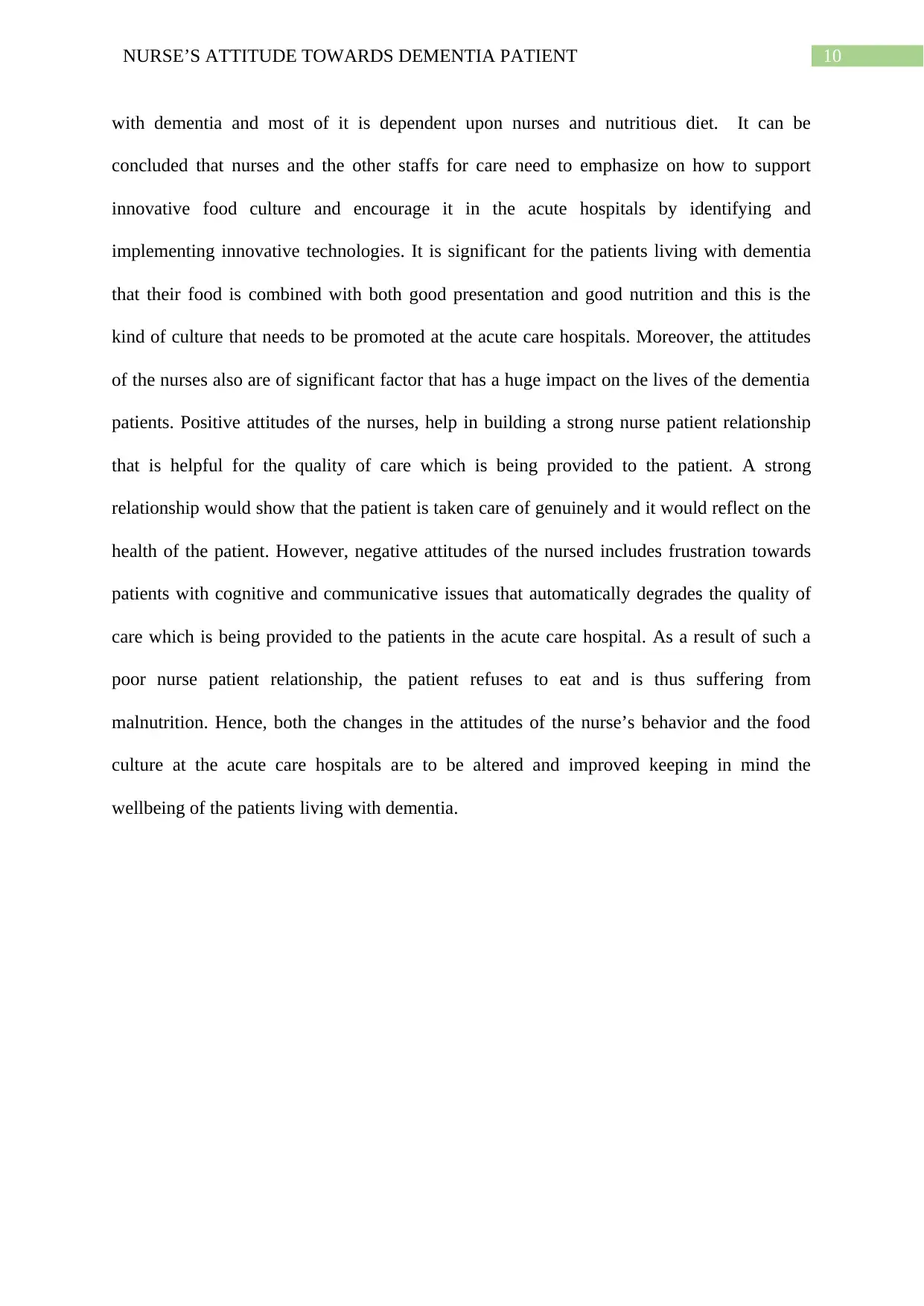
10NURSE’S ATTITUDE TOWARDS DEMENTIA PATIENT
with dementia and most of it is dependent upon nurses and nutritious diet. It can be
concluded that nurses and the other staffs for care need to emphasize on how to support
innovative food culture and encourage it in the acute hospitals by identifying and
implementing innovative technologies. It is significant for the patients living with dementia
that their food is combined with both good presentation and good nutrition and this is the
kind of culture that needs to be promoted at the acute care hospitals. Moreover, the attitudes
of the nurses also are of significant factor that has a huge impact on the lives of the dementia
patients. Positive attitudes of the nurses, help in building a strong nurse patient relationship
that is helpful for the quality of care which is being provided to the patient. A strong
relationship would show that the patient is taken care of genuinely and it would reflect on the
health of the patient. However, negative attitudes of the nursed includes frustration towards
patients with cognitive and communicative issues that automatically degrades the quality of
care which is being provided to the patients in the acute care hospital. As a result of such a
poor nurse patient relationship, the patient refuses to eat and is thus suffering from
malnutrition. Hence, both the changes in the attitudes of the nurse’s behavior and the food
culture at the acute care hospitals are to be altered and improved keeping in mind the
wellbeing of the patients living with dementia.
with dementia and most of it is dependent upon nurses and nutritious diet. It can be
concluded that nurses and the other staffs for care need to emphasize on how to support
innovative food culture and encourage it in the acute hospitals by identifying and
implementing innovative technologies. It is significant for the patients living with dementia
that their food is combined with both good presentation and good nutrition and this is the
kind of culture that needs to be promoted at the acute care hospitals. Moreover, the attitudes
of the nurses also are of significant factor that has a huge impact on the lives of the dementia
patients. Positive attitudes of the nurses, help in building a strong nurse patient relationship
that is helpful for the quality of care which is being provided to the patient. A strong
relationship would show that the patient is taken care of genuinely and it would reflect on the
health of the patient. However, negative attitudes of the nursed includes frustration towards
patients with cognitive and communicative issues that automatically degrades the quality of
care which is being provided to the patients in the acute care hospital. As a result of such a
poor nurse patient relationship, the patient refuses to eat and is thus suffering from
malnutrition. Hence, both the changes in the attitudes of the nurse’s behavior and the food
culture at the acute care hospitals are to be altered and improved keeping in mind the
wellbeing of the patients living with dementia.
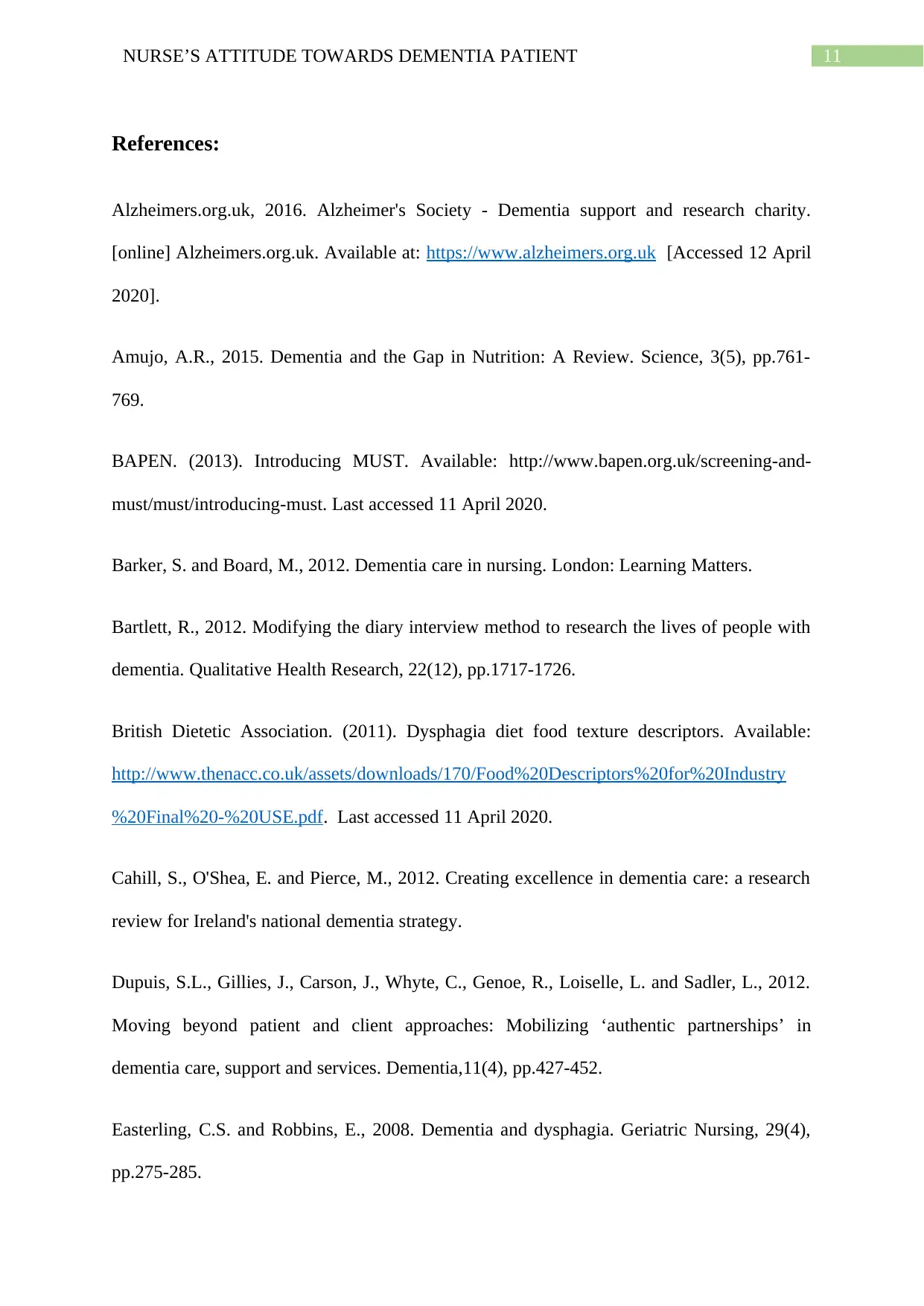
11NURSE’S ATTITUDE TOWARDS DEMENTIA PATIENT
References:
Alzheimers.org.uk, 2016. Alzheimer's Society - Dementia support and research charity.
[online] Alzheimers.org.uk. Available at: https://www.alzheimers.org.uk [Accessed 12 April
2020].
Amujo, A.R., 2015. Dementia and the Gap in Nutrition: A Review. Science, 3(5), pp.761-
769.
BAPEN. (2013). Introducing MUST. Available: http://www.bapen.org.uk/screening-and-
must/must/introducing-must. Last accessed 11 April 2020.
Barker, S. and Board, M., 2012. Dementia care in nursing. London: Learning Matters.
Bartlett, R., 2012. Modifying the diary interview method to research the lives of people with
dementia. Qualitative Health Research, 22(12), pp.1717-1726.
British Dietetic Association. (2011). Dysphagia diet food texture descriptors. Available:
http://www.thenacc.co.uk/assets/downloads/170/Food%20Descriptors%20for%20Industry
%20Final%20-%20USE.pdf. Last accessed 11 April 2020.
Cahill, S., O'Shea, E. and Pierce, M., 2012. Creating excellence in dementia care: a research
review for Ireland's national dementia strategy.
Dupuis, S.L., Gillies, J., Carson, J., Whyte, C., Genoe, R., Loiselle, L. and Sadler, L., 2012.
Moving beyond patient and client approaches: Mobilizing ‘authentic partnerships’ in
dementia care, support and services. Dementia,11(4), pp.427-452.
Easterling, C.S. and Robbins, E., 2008. Dementia and dysphagia. Geriatric Nursing, 29(4),
pp.275-285.
References:
Alzheimers.org.uk, 2016. Alzheimer's Society - Dementia support and research charity.
[online] Alzheimers.org.uk. Available at: https://www.alzheimers.org.uk [Accessed 12 April
2020].
Amujo, A.R., 2015. Dementia and the Gap in Nutrition: A Review. Science, 3(5), pp.761-
769.
BAPEN. (2013). Introducing MUST. Available: http://www.bapen.org.uk/screening-and-
must/must/introducing-must. Last accessed 11 April 2020.
Barker, S. and Board, M., 2012. Dementia care in nursing. London: Learning Matters.
Bartlett, R., 2012. Modifying the diary interview method to research the lives of people with
dementia. Qualitative Health Research, 22(12), pp.1717-1726.
British Dietetic Association. (2011). Dysphagia diet food texture descriptors. Available:
http://www.thenacc.co.uk/assets/downloads/170/Food%20Descriptors%20for%20Industry
%20Final%20-%20USE.pdf. Last accessed 11 April 2020.
Cahill, S., O'Shea, E. and Pierce, M., 2012. Creating excellence in dementia care: a research
review for Ireland's national dementia strategy.
Dupuis, S.L., Gillies, J., Carson, J., Whyte, C., Genoe, R., Loiselle, L. and Sadler, L., 2012.
Moving beyond patient and client approaches: Mobilizing ‘authentic partnerships’ in
dementia care, support and services. Dementia,11(4), pp.427-452.
Easterling, C.S. and Robbins, E., 2008. Dementia and dysphagia. Geriatric Nursing, 29(4),
pp.275-285.
⊘ This is a preview!⊘
Do you want full access?
Subscribe today to unlock all pages.

Trusted by 1+ million students worldwide
1 out of 16
Related Documents
Your All-in-One AI-Powered Toolkit for Academic Success.
+13062052269
info@desklib.com
Available 24*7 on WhatsApp / Email
![[object Object]](/_next/static/media/star-bottom.7253800d.svg)
Unlock your academic potential
Copyright © 2020–2026 A2Z Services. All Rights Reserved. Developed and managed by ZUCOL.





